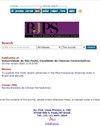假药:相关性、后果和应对全球危机的战略
IF 0.9
4区 医学
Q4 PHARMACOLOGY & PHARMACY
引用次数: 0
摘要
假冒药品,也被称为“伪造”或“掺假”,是指故意修改正品药品的身份、来源或历史的过程。目前,假药是一场全球危机,影响到亚洲、非洲和拉丁美洲的发展中国家,而且主要由这些国家造成。这些国家缺乏针对这种做法的严格执法,并且有需要医疗的低收入人口。最近,危机升级,影响发达国家,如美国和欧盟,主要是通过互联网。尽管时间延长了,但一些现行法律旨在控制和最小化危机的规模。药品造假维持着一条与合法供应链相连的非法供应链,这两条供应链都极其复杂,使得此类造假难以控制。此外,政治和经济原因与危机的迅速发展有关,对个人和公共健康以及不同国家的经济造成严重后果。最近,已经创建了一些组织、技术和计划来克服这种情况。然而,制定更有效的措施,将所有现有战略汇集成一个运作良好的大型网络,可以帮助防止获得假药,并提高一般民众的认识。本文章由计算机程序翻译,如有差异,请以英文原文为准。
Counterfeit medicines: relevance, consequences and strategies to combat the global crisis
Brazil Counterfeiting of medicines, also known as “falsification” or “adulteration”, is the process in which the identity , origin, or history of genuine medicines are intentionally modified. Currently, counterfeit medicines are a global crisis that affects and is mostly caused by developing countries in Asia, Africa and Latin America. These countries lack strict law enforcement against this practice and have low-income populations with medicinal needs. Lately, the crisis has escalated, impacting developed countries as well, e.g., the US and the EU, mainly via the Internet. Despite this extension, some current laws aim to control and minimize the crisis’ magnitude. Falsification of medicines maintains an illegitimate supply chain that is connected to the legitimate one, both of which are extremely complex, making such falsification difficult to control. Furthermore, political and economic causes are related to the crisis’ hasty growth, causing serious consequences for individuals and public health, as well as for the economy of different countries. Recently, organizations, technologies and initiatives have been created to overcome the situation. Nevertheless, the development of more effective measures that could aggregate all the existing strategies into a large functioning network could help prevent the acquisition of counterfeit medicines and create awareness among the general population.
求助全文
通过发布文献求助,成功后即可免费获取论文全文。
去求助
来源期刊

Brazilian Journal of Pharmaceutical Sciences
PHARMACOLOGY & PHARMACY-
CiteScore
1.40
自引率
0.00%
发文量
165
审稿时长
7.5 months
期刊介绍:
The Brazilian Journal of Pharmaceutical Sciences accepts for publication Original Papers applicable to the fields of Pharmaceutical Sciences; Reviews and Current Comment Articles, which are published under the Scientific Editor and Associate Editors invitation to recognized experts or when they are spontaneously submitted by the authors in the form of abstracts to have their importance evaluated. A critical view of the subject with insertions of results of previous works in the field in relation to the state of art must be included; Short Communications reporting new methods and previews of works on researches of outstanding importance in which originality justify a quick publication. A maximum of 2000 words excluding tables, figures and references is an acceptable limit. One table, one figure and ten references may be added, and Book Reviews of the latest editions of books, prepared by specialists invited by the Scientific Editor and Associate Editors. Thematic Supplements as well as those related to scientific meetings can be published under the Scientific Editor and/or Associate Editors agreement.
 求助内容:
求助内容: 应助结果提醒方式:
应助结果提醒方式:


